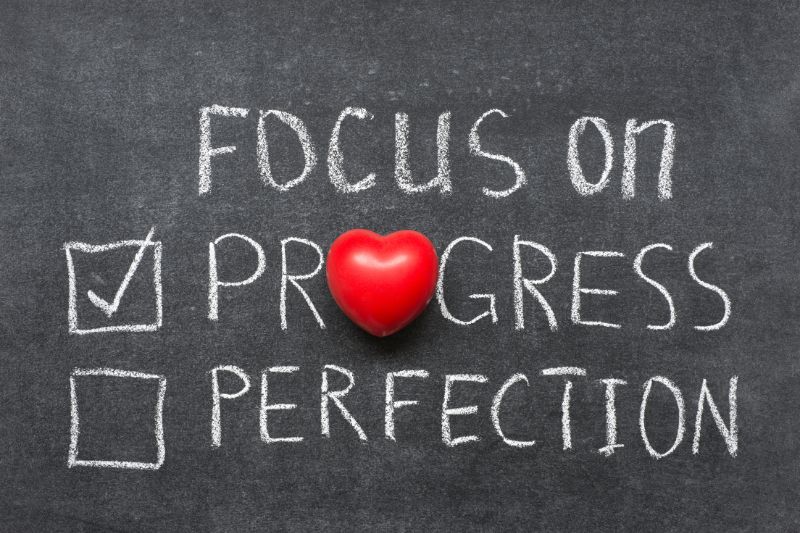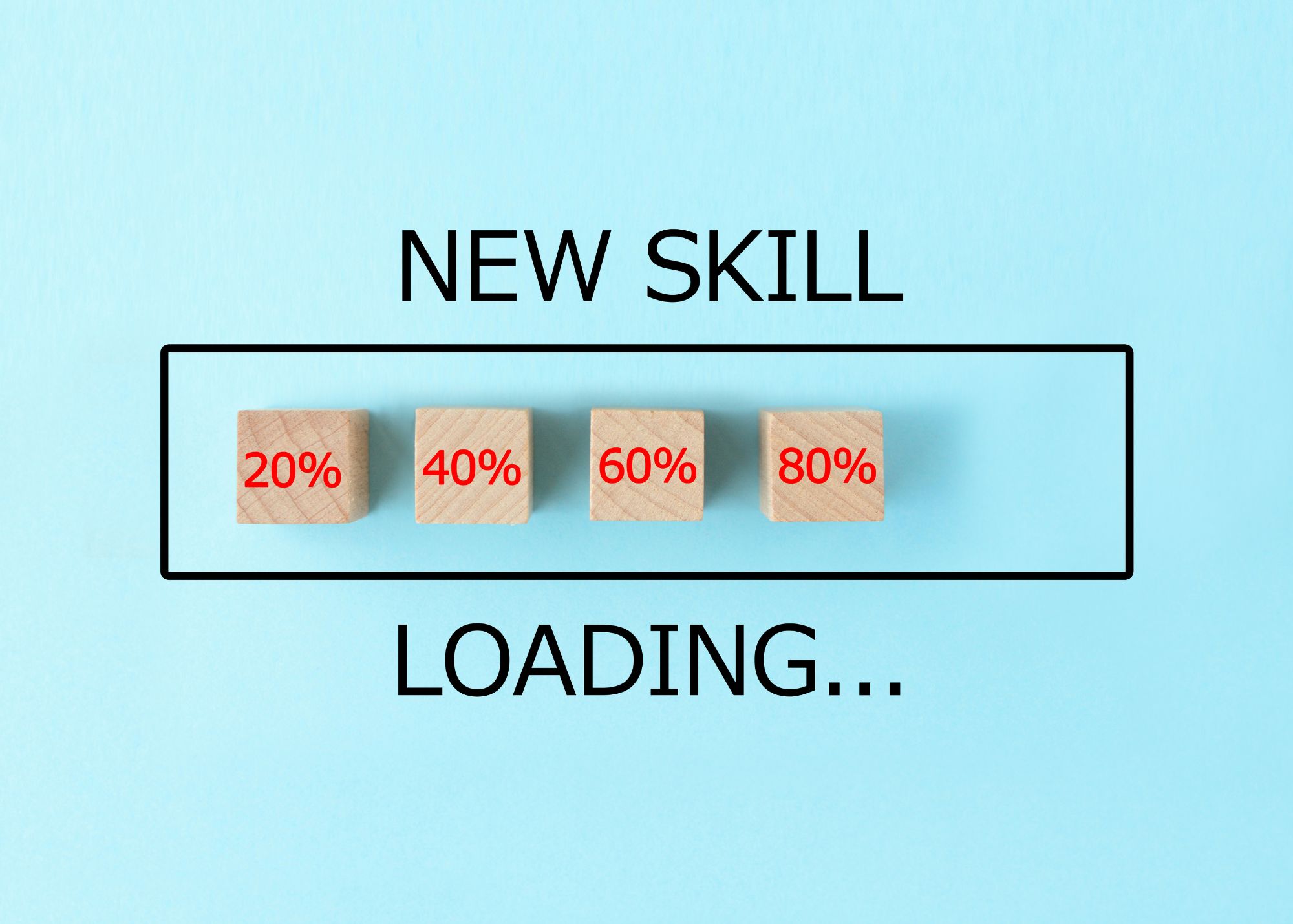 Dear Dr. Saline, What is the main skill to work on with someone to help with their executive functioning difficulties? Assuming they are not on meds. Sign-up for my newsletter + Free Handout | Ask Dr. Saline
Dear Dr. Saline, What is the main skill to work on with someone to help with their executive functioning difficulties? Assuming they are not on meds. Sign-up for my newsletter + Free Handout | Ask Dr. Saline
From Dr. Saline
Dear M: When I work with people to improve their executive functioning skills, we start with their primary areas of concern–the parts of daily life that are persistently tough for them. Since you didn’t mention your primary challenges, I recommend beginning with self-evaluation to find your main skill. Then, find a quiet time to reflect on these questions.
Questions to Consider:
- What are the performance or productivity issues that challenge you the most?
- How well can you manage your emotional reactivity or impulse control?
- How easily are you distracted from the task at hand?
- What helps you maintain focus and stick with goals?
- Do you find that you become overwhelmed and shut down more than you would like?
If I had a magic wand…
 Once you have considered these questions, ask yourself: If I had a magic wand and could change one thing about myself, what would it be? Then, consider all your responses and choose ONE main skill you would like to improve first.
Once you have considered these questions, ask yourself: If I had a magic wand and could change one thing about myself, what would it be? Then, consider all your responses and choose ONE main skill you would like to improve first.
How to start the process of change
Here are some tools you can use along the way to start the process of change: Inhibition and Emotional Control: Slow things down, pause before responding to anything, expect setbacks, and create a plan for recovering and making amends. Initiation: Break things down into smaller components; use Apps to assist you; reduce perfectionism so you can begin and complete things without pressure; decrease avoidance by starting with something easy to get rolling. Organization: Lay out steps for completing tasks; create daily routines; make spaces for dealing with and storing materials. Prioritizing: Do a brain dump to help you distinguish between what’s urgent and important; break that list down into a smaller list of 3 tasks and then identify their components in terms of time and values. Sustained attention and Goal-directed persistence: Consider possible obstacles to maintaining focus; create a system of reminders to redirect your attention after you have drifted off; set realistic goals based on your actual capabilities and schedule breaks. Working memory: Write things down where you can find and remember them; use alarms, alerts, and notifications; take notes during important meetings, classes, or conversations; if note-taking is difficult for you, brainstorm solutions with your supervisor, professor or partner that may include recording things or let caring coworkers or friends assist you by taking notes (you may also ask for ADA accommodations). Metacognition: Ask yourself questions that help you monitor and evaluate your productivity and emotional regulation and measure your progress toward your goals. Questions to start with: “How am I doing?” “What helped me before that I could apply to this situation?” 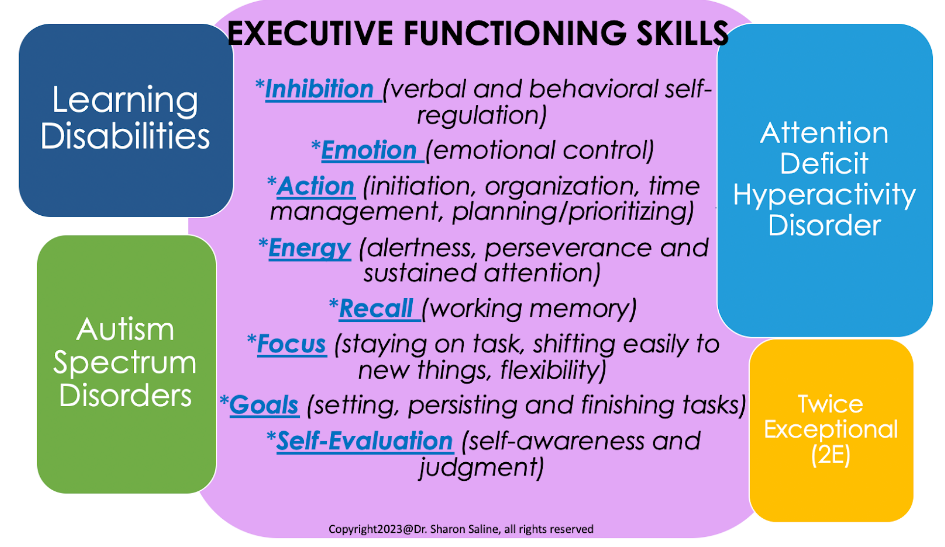
“Improving executive functioning skills takes practice, patience, and determination. While medication can be very helpful, pills don’t teach skills.” ~ Dr. Sharon Saline, Clinical Psychologist
Research
Recent research from the Florida International University Center by Dr. William Pelham found that, while medication-assisted children helped children complete more seatwork, improve their classroom behavior, and reduce rates of getting in trouble, children learned the same amount of subject material such as math, vocabulary, social studies, etc. as their peers. Another study by Dr. Pelham also emphasized the importance of behavioral therapy to learn tools and strategies to succeed at home, work, school, and social environments. Does this mean that people should stop taking medication? Absolutely not. But it underscores the importance of learning executive functioning skills for practical daily living.
In Conclusion
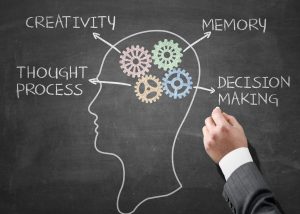 All human beings have executive functioning skills managed by the prefrontal cortex of our brains. Executive functioning skills describe the directive capacities of the brain. They work as a command center: connecting, prioritizing, and integrating cognitive functions moment by moment. They are responsible for self-regulation, linking memory to what we see and think about right now, self-awareness and judgment, and actions related to productivity and performance. People with ADHD have significant executive functioning challenges, with some areas of severity that can be quite impairing.
All human beings have executive functioning skills managed by the prefrontal cortex of our brains. Executive functioning skills describe the directive capacities of the brain. They work as a command center: connecting, prioritizing, and integrating cognitive functions moment by moment. They are responsible for self-regulation, linking memory to what we see and think about right now, self-awareness and judgment, and actions related to productivity and performance. People with ADHD have significant executive functioning challenges, with some areas of severity that can be quite impairing.
Want to ask Dr. Saline a question? Click Here
Become A Member
Please become a member of my newsletter community. You can find support and resources and connect with a group that understands your questions and needs. Click here Follow me on social media: YouTube, Facebook, Twitter, and Instagram. Invite Me to Speak | Join A Group | Newsletter | Read my blog
Sign-up for my newsletter today and receive 10% off!
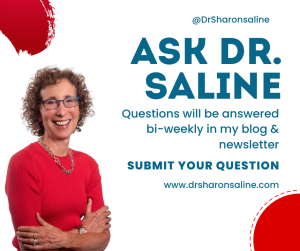


 Students with ADHD want to do well in school, and most of them put a lot of effort into their work. But at the same time, they must contend with issues around focus, organization, distractibility, impulse control and time management, and their academic workload. So let’s take a step back and see how you can prepare your response to a disappointing report card and a disappointed child.
Students with ADHD want to do well in school, and most of them put a lot of effort into their work. But at the same time, they must contend with issues around focus, organization, distractibility, impulse control and time management, and their academic workload. So let’s take a step back and see how you can prepare your response to a disappointing report card and a disappointed child. 

